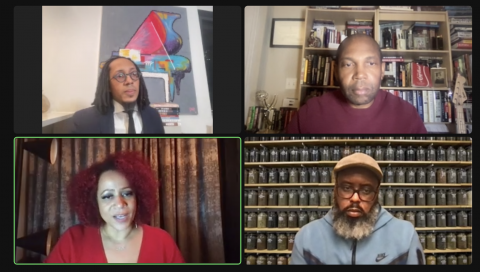“The Legacy of Ida B. Wells: A Conversation with the Co-Founders of the Society” recap

By Taylin Cain '23, IBWS intern
In honor of Black History Month and its fifth anniversary, the Ida B. Wells Society for Investigative Reporting hosted a special evening with co-founders Nikole Hannah-Jones, Ron Nixon and Topher Sanders reflecting on the lasting legacy of the organization’s namesake.
The discussion, held Feb. 23, 2022, focused on what it means to have Wells as the Society’s namesake and her work as a trailblazing paragon of investigative journalism during the late 19th and early 20th centuries. The co-founders shared how they were deeply inspired to name the Society after her to continue the efforts that expose abuses of power, hold our government accountable and work in the interests of the most vulnerable in our society.

Pictured: the co-founders Nikole Hannah-Jones (bottom left), Topher Sanders (bottom right), Ron Nixon (top right) and moderator D’Weston Haywood (top left).
“When we decided to found this organization, we very intentionally chose to name the organization after her because we wanted to show that there has been a long lineage of Black investigative reporting,” Hannah-Jones said.
Wells set the stage for Black investigative journalists to center their work around activism to progress and influence American life. The work of Wells was historically monumental, growing on the foundation of the antebellum Black press, which fought slavery. However, her work was often overlooked because it emphasized advocacy for Black press and exposed uncivil actions such as lynching of Black people.
“I like to say she was the original model of intersectionality,” Hannah-Jones said. “She was a woman who was a journalist, an investigative reporter, a civil rights activist, a suffragist, so she was working across multiple disparities at any given time.”
The hour-long conversation also included a Q&A with the audience that developed into how one can succeed as an investigative journalist of color. Many participants expressed a lot of the doubts and hesitancy they face when operating in the investigative journalism field as people of color.
The panelists reflected on the barriers journalists encounter when working to expose the truth through documented facts in an age where the truth is increasingly rejected or reconstructed. The Society was created to help combat that and to include diverse voices that raise the caliber, impact and raise the visibility of investigative journalism as a means of promoting transparency and good government. Investigative journalism has actively adjusted to the development of American society.
“In a sense, investigative journalism is advocacy journalism,” Nixon said. “We are all partisans to the truth.”
Sanders rejected the idea of needing new tools given that the foundations of journalism remain the same.
“I don’t know that a new set of tools that are required,” he said. “I think the basic foundations of what makes good reporting remain the same today as when Ida B. Wells was showing us how it needed to be done. I believe that, to be frank, the organizations that employ and support and help journalists do their work, they have to do better in this regard as it relates to how reporting is received and the support that it’s given once it’s out in the world.”
As for where the co-founders see the future of the Society in carrying out Wells’ legacy, Hannah-Jones said her hope is that the group continues to change the face of the field.
“We create more generations of investigative journalists of color and really change the complexion of our industry which will then change the complexion of our coverage,” Hannah-Jones said.